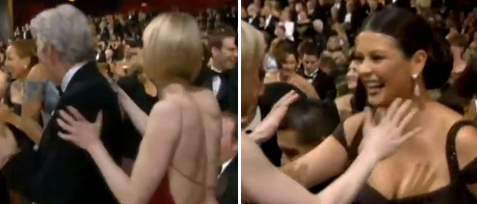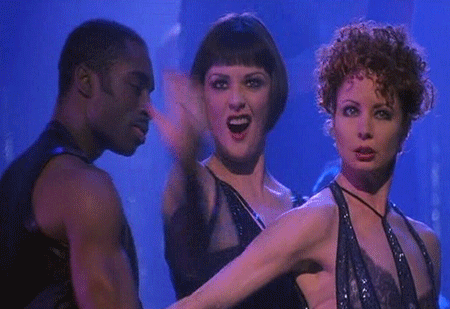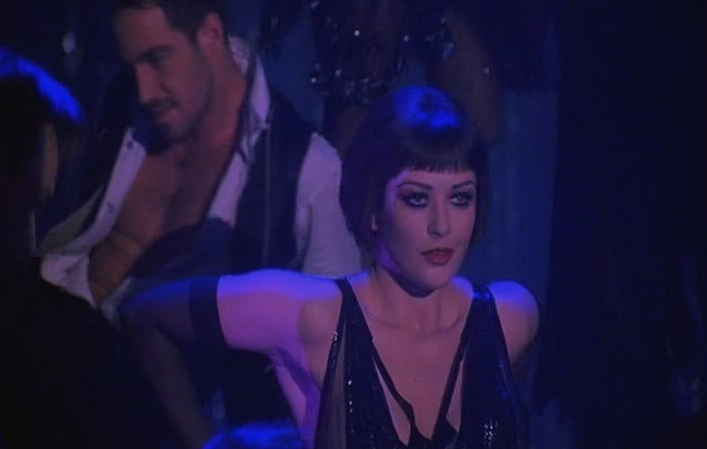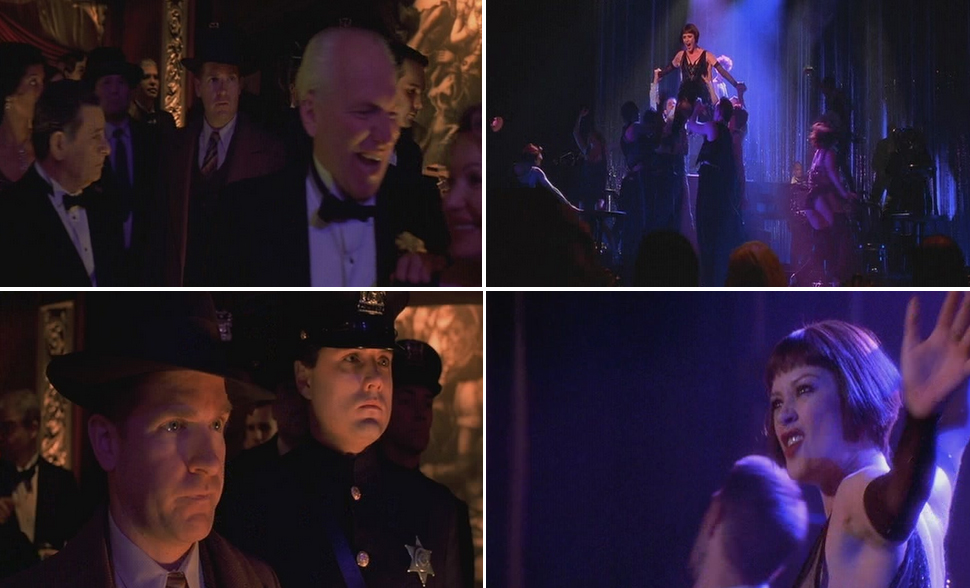10th Anniversary: That Jazzy "Chicago" Win
 Saturday, March 23, 2013 at 11:23AM
Saturday, March 23, 2013 at 11:23AM [Editor's Note: You know "Denny" well from the comments section. Since he's a choreographer by trade, I asked him to sound off on Dance in film. Particularly on Chicago since its win was so strangely celebrated at this year's Oscars making the show a weird mix of 2012 & 2002. Take it away, Denny. - Nathaniel R.]
 a happy night for CZJ & Friends, March 23rd, 2003
a happy night for CZJ & Friends, March 23rd, 2003
Oh, how I remember the cheers.
I was at an Oscar party with a group of theater friends ten years ago when Rob Marshall’s Chicago became the first musical in thirty-five years to win the Oscar for Best Picture. It’s easy to see why everyone was excited: Following Moulin Rouge! (and to a lesser extent, Hedwig and the Angry Inch) the year before, it was clear that Hollywood was finally interested in live-action musicals not aimed at children again. There hadn’t been a major live-action Hollywood musical aimed at adults since 1996’s divisive Evita, and before that the last one was 1986’s Little Shop of Horrors. The last to receive major awards attention was 1982’s Victor Victoria (or 1983’s Yentl, depending on your definition of “major awards attention”), and a musical hadn’t won the Oscar for Best Picture since 1968’s Oliver!, a much-derided winner in a year that actually saw two musicals nominated for Best Picture (the other being Funny Girl), if you can believe it. more...
Among the theater people I know, Chicago is still held up as a bit of a gold standard for filmed adaptations of stage musicals. Even though it takes place in the 1920s, the script’s cynical attitude couldn’t feel more modern, and the costumes, choreography, and camerawork combine to make it fresh ten years on. Compare it with the other movie musicals that won Best Picture (The Broadway Melody, An American in Paris, Gigi, West Side Story, My Fair Lady, The Sound of Music, and Oliver! – only the last four of which are adaptations of stage works) and it certainly stands out. Even in their best moments, none of these films come close to matching Chicago’s energy, its excitement – its “razzle dazzle”. This is a movie musical that knows how to put on a show of its own while still remaining pretty faithful to the source material.
Or at least, that’s what my friends responded to. I responded to the dancing. Having been a dancer since I was ten years old, I was finally starting to test the waters of actually creating dance – becoming a choreographer. Rob Marshall was a Tony-nominated choreographer before he took to directing, and his choreography in Chicago is pretty excellent. But that wasn’t what impressed me, exactly; I’d seen plenty of great choreography before, but this was different. It felt different. The opening number (the iconic “All That Jazz”) left my jaw on the floor, “Cell Block Tango” caused my eyes to practically pop out of their sockets, and by the time we got to “Roxie” I finally realized what made the dancing in Chicago feel so special: Marshall wasn’t just using the extra space working on a film gave him, he was using camerawork and editing to work with the music and choreography in a way few musicals had before.
 Invitation to Dance
Invitation to Dance
Choreographing for the camera, as I would later learn in my first choreography class, is its own skill set. Marshall proves he’s mastered it as early as Chicago’s first scene. In the stage version of Chicago, “All That Jazz” is basically an extension of the overture, an invitation to the world of the show, with no relation to the larger story. On film, it’s shown as the number Velma Kelly is performing the night she gets arrested, and adds a twist: In one of the swiftest examples of establishing a film’s visual signature in recent memory, the camera zooms in on Roxie as she hungrily watches Velma perform, and just when it can’t zoom any more or cut between the two of them any faster, Velma whips around to reveal Roxie in her place, singing the final word in the title phrase. Then, just as quickly as it happened, we’re out of Roxie’s fantasy back in the real world, as she leaves the club with her beau, Fred Casely.
From there, Editor Martin Walsh (a most deserved Oscar winner) intercuts Velma’s nightclub act with Roxie and Fred’s roll in the hay, images of entwining hands and loosening garter belts matching the choreography. Chicago’s greatest strength as a film is its editing, but it’s also one of the most divisive parts of the movie. I’ve heard it derogatorily likened to the style of music videos, but there hadn’t been an adaptation of a stage musical this kinetically shot and edited before (and arguably since). I know many people who dislike this style because it obscures the choreography. They aren’t wrong, but when it’s done well, as it is in Chicago, the editing actually enhances the choreography, matching the rhythms of the music and the choreography, allowing us to see (and hear) things in ways we couldn’t if a more straightforward style was used.

The choreography for “All That Jazz” starts out sexy and slinky, and our view is constantly obscured by patrons, chairs, and even the dancers’ own bodies, making the scene seem even seedier than it already is. Close-ups on feet, legs, and arms in motion fetishize every part of the performers’ bodies, moving just as fast and rhythmically as they do. Everything has a rhythm, interlocking with the music and the other movement on stage, and the camera captures this: a quick shot of a dancer fan-kicking her legs as she lays flat on a table follows it just as it fits the music. There is simply no way to recreate the feeling of that shot on stage – it’s shot from a higher angle than any seat in a theater, and the camera moves in such a way as to maximize the movement of the dancer. Not a single piece of choreography is wasted in this film; we get to see everything, even if it’s only a split second to punch a beat or out of focus in the background.
And Marshall never forgets that “All That Jazz” is a sister act turned into a solo act, with constant empty space on the stage where dancers are either non-existent or clearly improvising. There’s a feeling of something missing, even while it’s clear that Velma is a star you can’t take your eyes off of, whether or not she were sharing the stage with someone.
As the music grows in intensity, Roxie and Fred get more heated, and the choreography speeds up. The editing matches it step for step, even slowing down to just watch as everything grows quiet for second as Velma sinks into a circle of dancers. And then, just as Fred tells Roxie that she’s his little “shooting star” (hehe), the focus is all back on Velma to finish the number. Make no mistake: Velma’s the star here, and if the cops are going to come in (note how Velma makes her way to the front of the stage just as the cops enter the club in a matching shot) and arrest her, she’s going to give even them the best goddamn show they’ve ever seen.
 Row 1: Proceed to the front of the stage; Row 2: Is this the show you came to see?
Row 1: Proceed to the front of the stage; Row 2: Is this the show you came to see?
And so is Rob Marshall. He’s a true showman using all the tools at his disposal to entertain his audience. And in so doing, he takes a stage musical with a very theatrical concept and translates it seamlessly to film. Chicago is a near-perfect match of material, director, style.
What’s your favorite number/performance in the film? Or, if you're not a fan, which of its Oscars most trouble you? Find a flask, we’re playing fast and loose in the comments!

75th Annual Oscars ~ 10th Anniversary Special
Road to Perdition & Posthumous Gold
Nicole Kidman on Her Best Actress Win
Joe Reid & Nick Davis on The Hours
 10|25|50|75|100,
10|25|50|75|100,  Chicago,
Chicago,  Oscars (00s),
Oscars (00s),  editing,
editing,  musicals
musicals 


Reader Comments (12)
I CAN'T DO IT ALONE is my favorite number and Zeta-Jones rules! For the rest I'm not a fan and the Oscar that troubles me most is Best Picture
Is Zeta-Jones/Velma Kelly's category placement in supporting actress fraud? I argue that since she isn't telling the story—Roxie is, and all musical sequences revolve around Roxie's imagination, she's the unapologetic lead of the entire ensemble, at least this particular adaptation of it.
My God! 2002 was really a great year for the Oscar! My favourite movies were Far From Heaven and The Hours, but Chicago stood in the third place and I still love it, it's so electrifying. I finally decided to attend a musical theater academy few months after watching it.
I think my favourite number is "Roxie", but the opening anche "Cell Block Tango!, even "When you're good to mama" are outstanding too. Fabulous movie.
I love all of Chicago, I have seen it so many times. Enjoyed reading your post! All That Jazz is still my all time favourite, possibly the best opening to a musical ever! I done a 10 years on post too -http://letsgotothemovies7.com/2013/03/05/10-years-on-thats-chicago/
Everything Catherine Zeta-Jones touches in that movie is pure gold. I'm so happy for her Oscar win, even at the expense of a Julianne Moore win. 2002 is certainly one of the great years for women in film.
I feel like I've apologized for my Chicago love so much over the years - I won't even start on how I'd rank the BP nominees. Queen Latifah and her incredible "When You're Good To Mama" performance deserved that nomination, and Richard Gere deserved the snub. Rob Marshall would have gotten my Director vote, which I realize is a hell of a thing to say when Almodovar was sitting on his only Director nomination and Polanski/Scorsese had yet to win the honor. My two cents.
The opening number is great, but I think Cell Block Tango is the best. And I'm with eurocheese in being a fan of When You're Good to Mama.
CZJ was total category fraud - Chicago is a double act in every way and pretending otherwise is kind of offensive. Not least because it shot Queen Latifah down in a genuinelysupporting performance.
I'd like to register some love for John C Reilly, who was adorable. Mr Cellophane breaks my heart.
Chicago gave me one of those rare theatrical experiences in which you totally lose conscience of time and space. I've seen it a couple of times more and it's never been the same, but I really like it. I wish I could be more original, but my favorite number is All That Jazz.
SO GLAD for the Chicago love in the comments!
"Cell Block Tango" is probably my favorite number in the whole thing, but for this I wanted to focus on "All That Jazz" since it so effectively sets the stage (so to speak) for the rest of the film.
As for CZJ's category fraud, I really feel like it's a borderline case. In the Broadway production, Roxie and Velma are always co-leads, but in the film, Velma has a bit less to do than in the stage show (they took out three or four of her numbers), and they made it more clearly Roxie's story. I don't have a huge problem with it, although if I'm being honest, I was kind of pulling for Queen Latifah to win it. Her "When You're Good to Mama" is EXPLOSIVE.
If you liked this piece, check out my blog: dancindanonfilm.blogspot.com. I'll probably be posting something on "Cell Block Tango" in the next few days!
I do love both of the Billy Flynn numbers ("They both reached for the gun" and "Razzle Dazzle") but I think my favorite is the final "Nowadays/Hot Honey Rag" with both Velma and Roxie. The tone and energy give the film a great ending.
I saw a stage version with the amazing Caroline O'Connor that was pure Fosse a couple of years before so when I originally saw the movie I felt it was a little glitzy. Also I slightly resented Chicago because I believed it rode into Oscar glory on the back of Moulin Rouge.
Having said that, as the years have gone by I have become more of a fan. My favourite? Razzle Dazzle. I would say Cell Block Tango but I have seen too many Eisteddfod Dance Troupe travesty versions since then that it's been tainted.
"Roxie" might have been Renee Zellweger's best moment on film ever captured. Those mirrors! That sparkly costume! The dancing! Just breathtaking! So sad what she's turned into now. I have no problem saying that "Chicago" is my favorite BP winner of the last ten years. That might not have been the case had some other films won BP instead (looking at you, "There Will Be Blood," "Zero Dark Thirty," "Hugo," "Beasts," etc.). But being a "Chicago" apologist is tiring and boring, so I'm glad for the love shown to it here. I didn't mind the Oscars tribute either. Catherine Zeta-Jones nailed "All That Jazz" then and now. I'm fine with all of its nominations and wins. I would have found a place for Richard Gere too, but in supporting actor, and not at the expense of John C. Reilly (I'd have tossed out Walken, who was nothing special to me in "CMIYC"). I always wonder if the Oscars had been held a few weeks later, would "The Pianist" have overtaken it in BP? Probably yes, but I'm glad for the actual outcome all the same. "The Pianist" didn't "need" BP like "Chicago" did, and both films have aged perfectly well, so no losers there. Nice write-up, Denny!